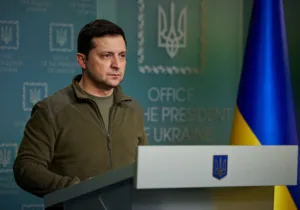Why do self-identified Christian nationalists widely disdain U.S. aid for Ukraine? Why does self-identified Christian Nationalism (believing in official establishment of Christianity) tend towards isolationism?
Many Protestants, almost always Calvinist young men of the New Right, identify as Christian nationalists. They believe liberal democracy, with full religious liberty for all, has failed. So, they advocate for a confessional state or something akin to it that privileges their form of Christianity.
There’s no reason that Calvinist Christian nationalism should necessarily be isolationist. Calvinists during their halcyon epoch in the 1500s and 1600s were a famed international movement, not strictly nationalist. They largely favored a transnational Calvinist collaboration to include adherents in England, Scotland, the Netherlands, France, Switzerland, and elsewhere. For Britain they wanted an active Protestant foreign policy aligning with continental Protestant forces against Catholic nations and empires.
So why would Calvinist confessional state Christian nationalists not favor helping Western-aligned Ukraine against Russia’s invading forces? The old Puritans and Presbyterians would likely not have hesitated to align against Russia. They would have seen Russia as an Asiatic despotism intrinsically hostile to Protestantism and Protestant notions of liberty. They would have quickly favored Ukraine, which has an active evangelical minority and offers freedoms to Protestants not easily available in Russia.
In America’s own history, Calvinists, including Presbyterians and Congregationalists, have typically been internationalists, both in their own overseas missions but also in their vision for a morally elevated American influence globally. Often they have seen America as the temporal incarnation of Protestant liberty that is obliged to share its blessings with others.
Perhaps the Calvinist confessional state Christian nationalists would argue today that America has become secular and immoral. But America during their earlier celebration of its influence was slaveholding, sometimes slave trading, and host to a multitude of other inequities, which Calvinist preachers robustly condemned. And yet Calvinist celebrants of America saw that amid its sins American ideals still could transmit an alternative to spiritual darkness, despotism, and poverty.
Contemporary self-identified Christian nationalists think differently. William Wolfe of the The Center for Baptist Leadership, who self-identifies with Christian nationalism, tweeted: “What the neo-con warmongering crowd refuses to acknowledge is that the legitimate basis of much of the frustration of the America First crowd on Ukraine funding is that *our nation* is not in order.” He cited the border “being invaded,” Americans “being slaughtered by illegal aliens,” the economy “in the tank,” national debt, “Christians are being persecuted right here, wokeness, and transgenderism. “The American government needs to prioritize our citizens first,” which is “both just and biblical.” Wolfe insists that “if our country was doing well, and not collapsing, we could have a different conversation about that merits and demerits of sending our money to Ukraine.”
What would Wolfe have said in 1941, when FDR and some Republican allies, like War Secretary Henry Stimson, were pushing for U.S. aid to Great Britain and China amid strong objections from voices like Wolfe’s? Unemployment and inflation in 1941 were three times today’s levels. America was a far poorer country then, more racially segregated and stratified, and more divided by wealth, class, region, and religion. Waiting for America to start “doing well” would have required ceding Great Britain, and the rest of Europe, to Nazi control. Likewise, China, with the rest of Asia, would be ceded to imperial Japan.
Wolfe also tweeted that “Ukraine doesn’t have the manpower nor the munitions to win this war—and the US can’t provide that, even if we should (we shouldn’t.).” The same could have been said in 1941 of isolated Great Britain and China, which had suffered massive defeats and were heavily outgunned by their German and Japanese attackers.
Faulting the Southern Baptist Ethics and Religious Liberty Commission for supporting Ukraine aid, Wolfe tweeted: “How many more Ukrainian lives does ERLC want to send into the meat grinder to die for a war that cannot be won? Fighting age males in Ukraine are fleeing by the thousands. More American $ will do nothing but prolong this. This is a neo-con warmongering. And it’s deeply unethical.” The same could have been said of Afghan resistance to Russia’s 1979 invasion, until Russia was forced to withdraw in 1989, thanks partly to American help for the Afghan resistance, which was far weaker than Ukraine.
Wolfe’s rhetoric reads like a transcript from a 1941 America First rally, which, touting “peace,” portrayed Britain as defeated and urged negotiation with the Third Reich. Ironically, Hitler was probably more open to negotiation with Britain than Putin is with Ukraine. Wolfe condemned U.S. House Speaker Michael Johnson for supporting Ukraine aid, whose passage prompted Wolfe to tweet as House members waved Ukrainian flags: “If you see foreign flags waving in your seat of government, it’s because you’re a conquered nation.”
Conquered by whom? America Firsters in 1941 would have said the banks, arms merchants, the northeastern establishment, British interests, and the Jews. (Wolfe, in response to this article, says he is not an isolationist but a “realist” and “non-interventionist.”)
Another Wolfe, named Stephen, author of The Case for Christian Nationalism, the premier contemporary argument for a Calvinist confessional state, has also tweeted derisively about Ukraine. “If you don’t support dropping bombs on young Russian men, you’re on the wrong side of Jesus,” he tweeted sarcastically. More strategically, he complained: “China wants us to shower Ukraine and Israel with money.” In response to Southern Baptist Ethics & Religious Liberty Commission support for helping Ukraine, Wolfe responded: As “The ERLC (along with the evangelical elite in general) is the evangelical arm of the ruling class. It is a regime evangelical organization. This explains all of their behavior.” In response to a pro-Ukraine voice, he quipped: “Center-right today means voting for the trans-the-kids party to keep young men dying in Ukraine.”
In a similarly mocking vein, Timon Cline, editor of American Reformer, which advocates a form of Calvinist confessional statism, tweeted “Now look here, Jack! America First means Ukraine First, got it? Freedom is freedom is freedom! Poland is next! Don’t believe me! Ever heard of Hitler? Nuff said! But also Putin in a feeble, deranged madman & Russia army sux cuz Zelensky tuff & tru fren!” Ho-ho-ho.
More thoughtfully, Colin Redemer, who does not identify as Christian nationalist, writing for American Reformer in 2022, sympathized with Ukraine’s suffering but cited just war teaching against U.S. war help. “War, if necessary, must be the last resort,” he said, “Russia’s invasion of Ukraine cannot be justified, but our refusing to tone down the overheated rhetoric and consider ways to find peace is also incredibly dangerous.” He suggested Ukraine was right to resist, but the U.S. was not wise to assist.
That’s of course a reasonable point from a narrowly realist, non-interventionist perspective, to be found on the political right and left. At least it’s not contemptuous of Ukraine and its supporters. Some confessional state Christian nationalists link support for Ukraine with domestic U.S. cultural battles, oddly conflating Ukraine with Western progressivism. They ignore that Ukraine is more church going, demographically Christian, and friendly to Protestants than its attacker, Russia.
There is of course no divinely revealed Christian foreign policy that dictates what the U.S. should do towards Ukraine. The arguments for helping Ukraine include moral solidarity against aggression, resisting a dictatorship that is a strategic rival to the U.S., and discouraging further Russian aggression aimed at NATO allies that would entail direct U.S. involvement.
Arguments from some Christian nationalists against Ukraine do not seem especially theological but instead rely on conventional U.S. populist isolationist perspectives that echo the 1930s. Those views, whether today or in the 1930s, assume the U.S. is always governed by corrupt elites indifferent to real national interests and beholden to alien, cosmopolitan forces. In this view, the U.S. should focus inwardly on its own problems, and disdain overseas commitments.
From the Christian realist view, articulated by Reinhold Niebuhr before and during World War II, the U.S. does not have this luxury of inward focus. Interests and responsibility require U.S. engagement with the world, especially against aggression by potent adversaries. He warned against the hubris of national self-righteousness, whether through isolation or excessive assertiveness. Neither the U.S. nor any nation is ever domestically “fine.” But internal troubles don’t obviate reasonable exertions against external adversaries and reasonable solidarity with allies against aggressors.
Although Niebuhr sometimes warned against it, he still recognized the power of America’s Puritan Calvinist ideals that aspire to right the world’s problems where possible. The struggle is always to balance the ideals with reality and responsibility. Escapism and contempt, to which some professed Christian nationalists resort, should never factor in this calculation.






